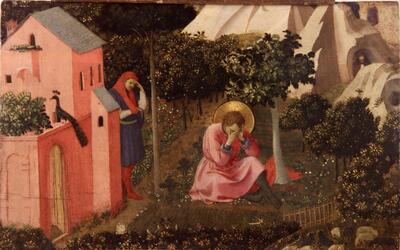“I am a son of St. Augustine."
"I am a son of St. Augustine, an Augustinian."
Pope Leo XIV spoke these words during his inaugural papal address to the world in May, and when he did, the spiritual heritage and legacy of St. Augustine of Hippo briefly rushed to the foreground of Catholic commentary. Today as we mark the memorial of St. Augustine, bishop and doctor of the Church, it is a fitting day to reflect on the gifts that St. Augustine has left the Church so many centuries later alongside some of the words of St. Augustine that shaped Pope Leo XIV.
Born in Thagaste in North Africa (modern day Algeria), St. Augustine (354- 430) is one of the most well-known saints in Church history. He was a bishop, a theologian and philosopher. His early life and conversion story are recorded in his work The Confessions--essentially inventing the genre of spiritual autobiography--and he served the Church during a tumultuous period in history including through the sack of Rome and the collapse of the Roman Empire. It is difficult to overstate his contributions to Catholic theology and western philosophy and thought.
Dominicans can also claim a spiritual heritage connected to the heart of St. Augustine. When we think of the founding of the Order of Preachers, we (of course) first think of St. Dominic and the most well-known saints from the order, such as St. Peter of Verona, St. Albert the Great, and St. Thomas Aquinas. But the order also shares a spiritual kinship with St. Augustine, since the Order (like many others) uses the Rule that was written by St. Augustine around the year 400 to govern community life, prayer, and the practices of the religious community. (St. Augustine’s rule is the earliest surviving monastic rule to govern life in monastic/religious communities and predates the Rule of St. Benedict by about 120 years).
In these early days of his pontificate, Pope Leo has quoted St. Augustine prolifically. To nourish our spiritual reflection on this feast of St. Augustine, we can consider two quotes that Pope Leo has cited frequently.
For you have made us for yourself, O Lord, and our hearts are restless until they rest in you. (St. Augustine)
Many of us may have read and reflected upon this quote, taken from the first chapter of St. Augustine’s spiritual autobiography. It may be the most famous quote of Augustine’s and remains permanently relevant. Pope Leo XIV has mentioned it in numerous homilies and addresses during his papacy (including his address in June to Catholics in Chicago). During our everyday lives, we can be occupied (and preoccupied) with the pressing concerns in front of us. It is often tempting to think some version of: “If I only get through this week, things will calm down.” “If I can just get past this rough patch, things will improve.” “If I could solve this particular situation, avoid this person, heal this illness, or find financial success, I would be at peace.” By quoting this line from St. Augustine so frequently, Pope Leo reminds us that in the end, nothing by God’s infinite love can satisfy the longings, anxieties, and desires of our heart. We are made for God, and God alone suffices.
With you I am a Christian, for you I am a bishop. (St. Augustine)
The dizzying number of theological writings that St. Augustine penned were completed while he was the bishop of Hippo and during his ministry. Sometimes he lamented not having more time to write, but part of the reason he remains relevant is because he was engaged in the running of his diocese, in his work as spiritual father to those around him, and as an advisor to many who sought his spiritual council. We know of St. Augustine now because of the legacy of his writings, but his writings existed for two reasons: because he himself sought to know the Lord whom he loved through his writings, and because he found much of his writing pastorally relevant--or at least, that the needs and the concerns of the Church drove him to write.
Many of his surviving texts are homilies that he preached, letters he wrote responding to theological concerns, or even addressed as advice to others. His work Instructing Beginners in Faith, for example, was addressed to Deogratias, a deacon in Carthage who asked for advice on how to preach to those new to Christianity. St. Augustine first sought to love God and neighbor (as the first paragraph of his Rule directs) as a Christian, and he saw his ministry as a bishop not for his own benefit or honor but for the needs of his people.
To honor St. Augustine’s memory, maybe today we can all say with Pope Leo that, united in faith, we too are sons and daughters of St. Augustine.
St. Augustine, pray for us!
Hope Zelmer
Hope Zelmer is a writer and a former theology teacher and campus minister at Fenwick High School, a Dominican Catholic preparatory school in Oak Park, Illinois. Hope has written for publications such as FaithND, Church Life Journal, and Femme Catholic. She holds a BA and MA in Theology from the University of Notre Dame.


